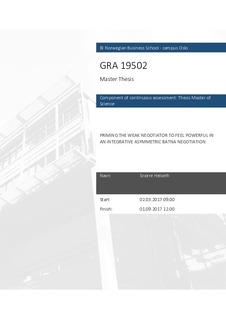Priming the weak negotiator to feel powerful in an integrative asymmetric batna negotiation
Abstract
Power asymmetries are present in most negotiations, and power influences
economic outcomes in negotiations. The most common way to manipulate power
asymmetries in negotiation experiments is through BATNA, Best Alternative To
Negotiated Agreement. Research has shown that individuals with a stronger
BATNA claim higher economic outcomes than their counterpart´s. Another used
tool in manipulating power is through priming one party to feel powerful prior to
the negotiation, and this manipulation has also indicated higher economic value
claiming for the individual being primed to feel powerful in BATNA symmetric
negotiations. This study includes three experiments, and investigates both
individual outcomes across roles, and joint outcomes across experiments, as well
as subjective outcomes. The study investigates whether priming a negotiator with
weaker BATNA than their counterpart to feel powerful, can leverage the
advantage of the individual with the stronger BATNA. Furthermore, whether
knowledge (perceived power) or no knowledge (potential power) about BATNA
asymmetries between the negotiators influence the economic outcome of the
individual being primed to feel powerful. The results for this study indicate a
small increase for the weak negotiators being primed to feel powerful (M =
7753.33, SD = 2024.80) in comparison to the weak negotiators who were not
primed (M = 7716.67, SD = 2395.84) in asymmetric BATNA negotiations with
perceived power. However, none of the results found showed to be statistically
significant. Joint outcome scores across experiments show that negotiations
without knowledge (potential power) about the BATNA asymmetries scored
higher (M = 16506.67, SD = 2454.40) than negotiations with knowledge
(perceived power) about the BATNA asymmetries (M = 15793.33, SD =
2454.82). However, none of the results found showed to be statistically
significant. The results and the limitations of the study are discussed, and future
research is outlined.
Description
Masteroppgave(MSc) in Master of Science in Leadership and Organizational Psychology - Handelshøyskolen BI, 2017
